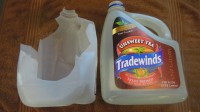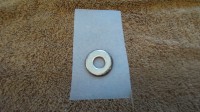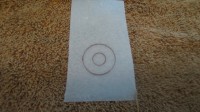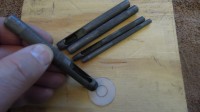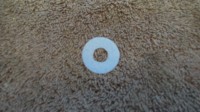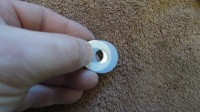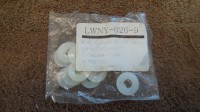This simple technique will help prevent marring delicate surfaces under fasteners, such as fresh paint or chrome. Using commonly available plastic milk or beverage containers and a regular washer as a pattern, one can quickly and easily make a plastic insulator. Essentially, the plastic disc becomes an isolator preventing the metal of the fastener, usually a washer, from coming in direct contact with the surface you wish to protect. The milky-white color of the plastic (no pun intended) allows the washer to virtually disappear, especially if the outside diameter of the disc is cut slightly smaller than the pattern washer.
The photos show the process. Using a fine tip felt marker, draw the outline of the steel washer, including the center hole. Common household scissors can easily be used to cut out the insulator, just inside the pen line. The center hole can be cut with a sharp hobby knife, though I prefer to punch the center hole using a punch made for leather work. Using a piece of wood beneath the plastic as a backstop, simply align the largest punch available with the center hole pen line, and hit the punch with a soft-faced hammer. These inexpensive punch sets are readily available, I bought my set at one of those swap meet/flea market tool both vendors commonly found at tractor/car/motorcycle shows. They are also available through eBay and I’m sure other other sources online.
You will note in one photo that I show two different types of plastic jugs. My personal preference is to use the jug on the right, as the plastic is a bit heavier that a common milk jug, but still easily trimmed. Either type of plastic will work fine, though. Also, commercially made plastic insulating washers are sold by Eastwood in various sizes for this very purpose. I also have several sizes of the Eastwood washers in my shop and one of the photos shows an example. These insulators are made from a hard white plastic, probably nylon, are quite thick and are clearly designed for use on automobiles. However, I find them a little too thick and heavy for much of my work, so I don’t use them very often. They are tough though, if a bit expensive.
One other note, this technique will only work well on assemblies that are not highly tightened or torqued. In other words, situations where light assembly is involved. If tightened too tight, the plastic is soft enough that it will actually squeeze out from under the washer, reducing the benefit.
I’ve been using these home-made plastic disc insulators on my projects for years, they are free, quick and easy to make, and when used appropriately, will protect that shinny finish, whatever it might be.
